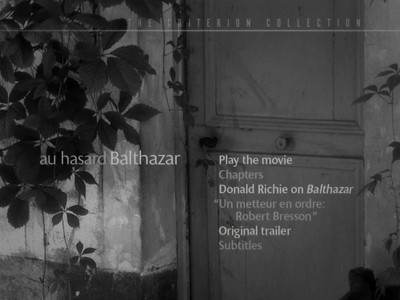
Throughout his many films, French writer/director Robert Bresson struggled to realize his unique, almost dogmatic ideas about how to achieve truth and meaning through motion pictures. His many theories were detailed in the collection of his writings, Notes on the Cinematographer
Knowing this, then we can assume that Bresson found his ideal model in the form of the donkey, Balthazar, who is the central figure in the filmmaker's 1966 allegory Au hasard Balthazar. The animal's patience, his deep stares, his lack of language--all of these things contributed to the creature being the ultimate mirror for Bresson to hold up to humanity and reflect its most selfish and dark impulses.
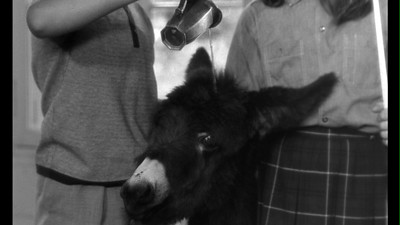
On a provincial farm in rural France, Balthazar is adopted by the children of the landowner. For a summer, he is the companion of the boy Jacques, his sisters, and Marie, the daughter of the local schoolteacher. The kids baptize him in a mock ceremony and name him for one of the three wise men who traveled to witness Christ's birth. So, too, does this Balthazar become a witness, first to the young love between Jacques and Marie, and then to the death of Jacques' youngest sister. It's the animal's first life lesson, that happiness and misery often come hand in hand, and it's the beginning of the erosion of innocence that Balthazar will resiliently stand against.
In the donkey's travails, he has something in common with another Biblical character, that of Job. Job was the servant of God whom the Almighty put through a variety of harrowing tests in order to make him an example of faith and perseverance for centuries to come. Balthazar will also endure many tests. Having been sent away from the farm by Marie's father (Philippe Asselin), a prideful man intent on showing the rest of his village that he is a modern thinker, Balthazar is pressed into a variety of jobs pulling wagons full of crops and other cargo. After an accident, he returns to the now teenaged Marie (Anne Wiazemsky). What should be an act of providence doesn't last, however; eventually, her father sells the donkey again, this time to the local bakery to use for deliveries. The delivery boy is a juvenile delinquent named Gerard (Francois Lafarge), who is prone to random acts of cruelty, like tying a newspaper to Balthazar's tail and setting it on fire. Gerard is also a featured singer at church every Sunday, making him just one of the many examples of townspeople who present themselves in one manner when others are watching but who are much different deep down.
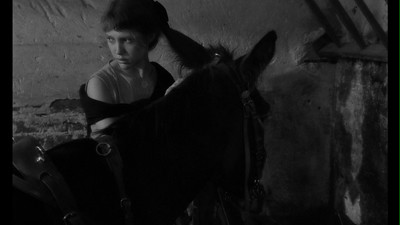
Except Balthazar is always watching. A symbol of patience and perseverance, he is ever-present, never changing, never judging. He sees everyone as they really are, witnessing the baker's wife's lust for Gerard and Gerard's lust for Marie. The animal is passed from one owner to another, but the people are less personalities than they are an endless string of sins. There is the pride of Marie's father, the greed of the old miser (Pierre Klossowski), and Marie's giving in to temptation. The latter is one of the few things that seems to affect the donkey, prompting him to practically give up before seemingly being rescued by the strangely beatific Arnold (Jean-Claude Guilbert). Except Arnold, who serves as a grown-up analogue to Gerard, is a false prophet. He is a drunk and a murderer, and after being sent away on Balthazar in a near comical recreation of Christ riding a burro on Palm Sunday, this figure of evil who inspires dread in the little donkey falls from his mount and cracks his skull.
Because with sin comes consequence. Even as Balthazar endures, the humans suffer. Much of the cruelty that is visited on the donkey is an angry reaction to the purity he represents. Seeing what they can never be, they want to blot him out. There is a sort of irony to how the dark coloring of this downtrodden creature causes him to stand out from the townspeople, but then the whole setting has its own inherent incongruity. The small village looks antiquated, and the presence of automobiles and leather-jacketed thugs appear anachronistic to the rundown buildings. Arguably, Balthazar is the antidote for modernity. He is slow in comparison to the cars that speed by him on the road, but he is steady, not prone to losing his footing when he encounters petty temptation the way the cars spin off the road when Gerard and his gang lay down an oil slick. Marie's father, even, wants to get rid of Balthazar for the traditional methods he represents.
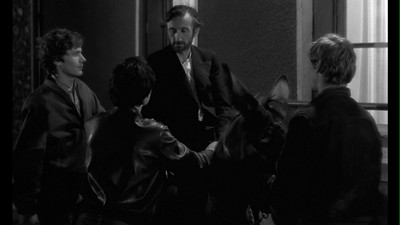
Metaphorically, it's a clash between a wicked world and a world that values purity. Morality is so out of whack, no goodness can be tolerated. The one decent person in the whole movie is Jacques (Water Green), who returns to the old farm when he's grown up to try to square things with Marie's father and ultimately even to marry Marie. Even after she confesses that she is no longer a virgin, Jacques doesn't care. I doubt it's a mistake that his outfit, the dark sweater and the white shirt underneath, is the same color scheme as the dark-maned, white-snouted Balthazar. It's also no coincidence that when Marie decides to be with Jacques and renounce her past, Gerard takes his revenge.
Amazingly, through all that Balthazar must suffer, Bresson never makes the animal pitiable. He is Christ-like in this way, ready to accept the indignity and punishment of the mortal world in order to inspire greatness in others. In the final scenes, Gerard loads the donkey down with treasures, prodding him on a journey through the night toward the promise of greater reward--a twisted version of the Biblical Balthazar's journey to Bethlehem. This little smuggling operation runs afoul of the law, though, and Balthazar is abandoned. Left alone and on his last legs, wounded in the side the way the crucified Christ was stabbed by Roman soldiers, Balthazar is transformed into a saintly figure, a martyr. He wanders into a field and joins a flock of sheep, and they gather around him, the multitude welcoming him home. It is at once sublime and sad.
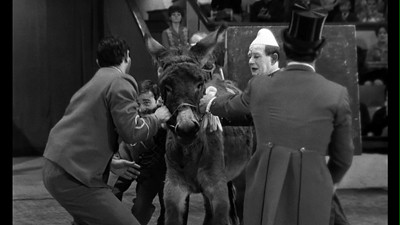
In terms of Bresson's style, Au hasard Balthazar is a realization of his idea that behavior is a more effective storytelling device than expositional narrative. By using allegory, he can separate his town from a more conventional reality, and much like the Biblical parables that have inspired him, characters can serve the purpose of the story in ways that may not play out in real life (for instance, Gerard never being arrested or punished despite everyone knowing of various crimes). He doesn't push the religious aspects of the story too hard, and even when he gets blatant (Arnold being called a devil, Marie's mother calling Balthazar a saint before loaning him to a church procession), it grows naturally from the situation. Bresson prefers his actors move more than speak, that they do rather than explain.
Again, this is where the animal character serves him well. Balthazar can't speak. He can bray, but I believe even that only occurs three times in the movie--once to announce to Marie that he has returned, the other two times as portents of evil approaching. Instead, he wanders amongst the humans as a silent observer, inspiring them to act through his inaction. No matter how bad things get, he never buckles, and in that, he is the most human of all, capable of more goodness than the allegedly smarter creatures that should know better. His divinity comes in his consistency, a trait Bresson maybe wished to cultivate more than any other. That it took a donkey to realize this endeavor merely proves that, like God, cinema often works in mysterious ways.
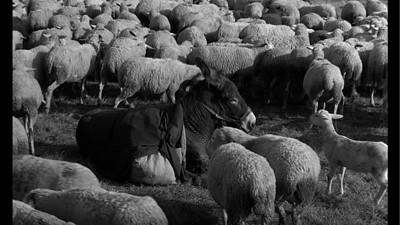

No comments:
Post a Comment